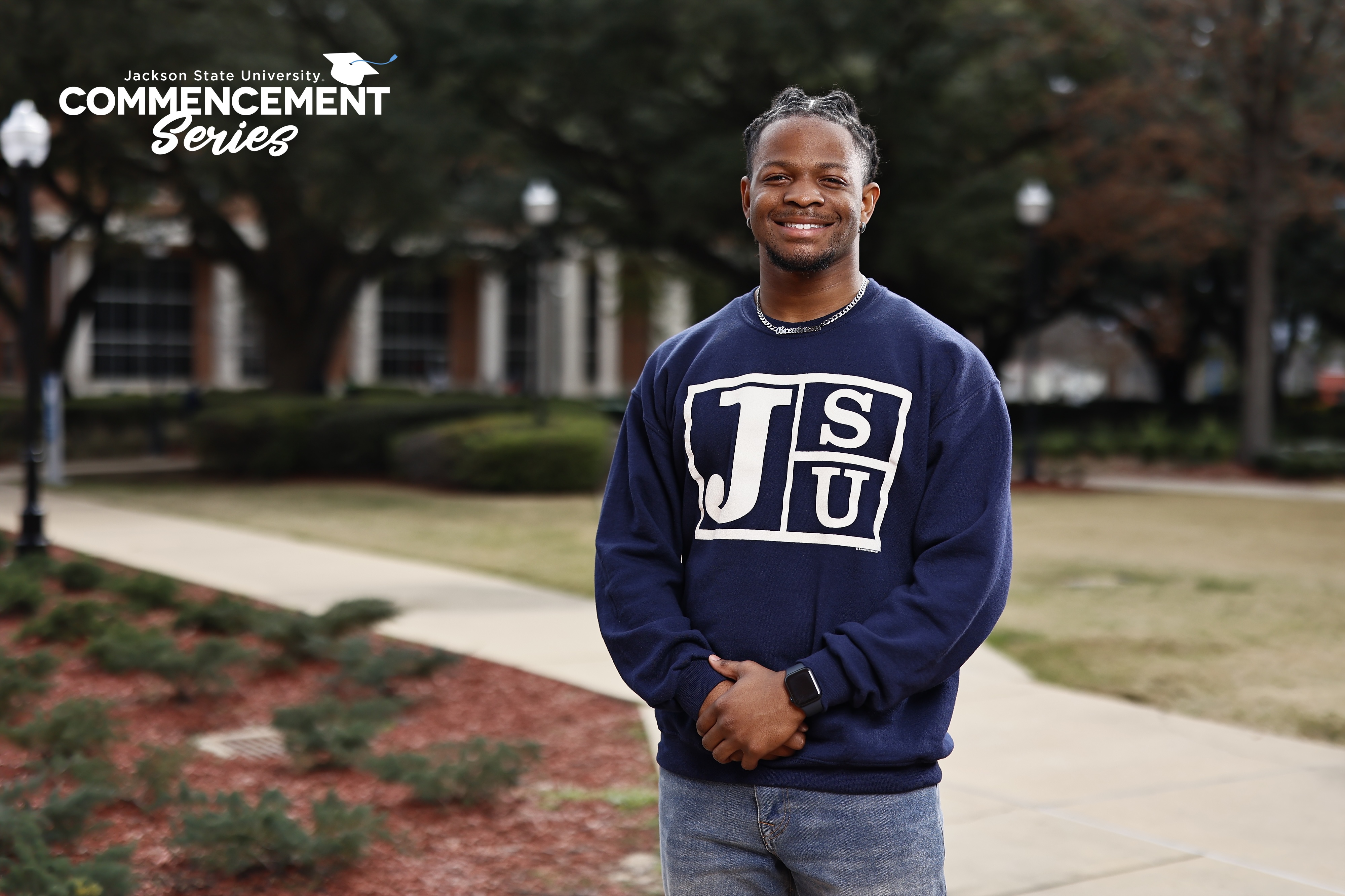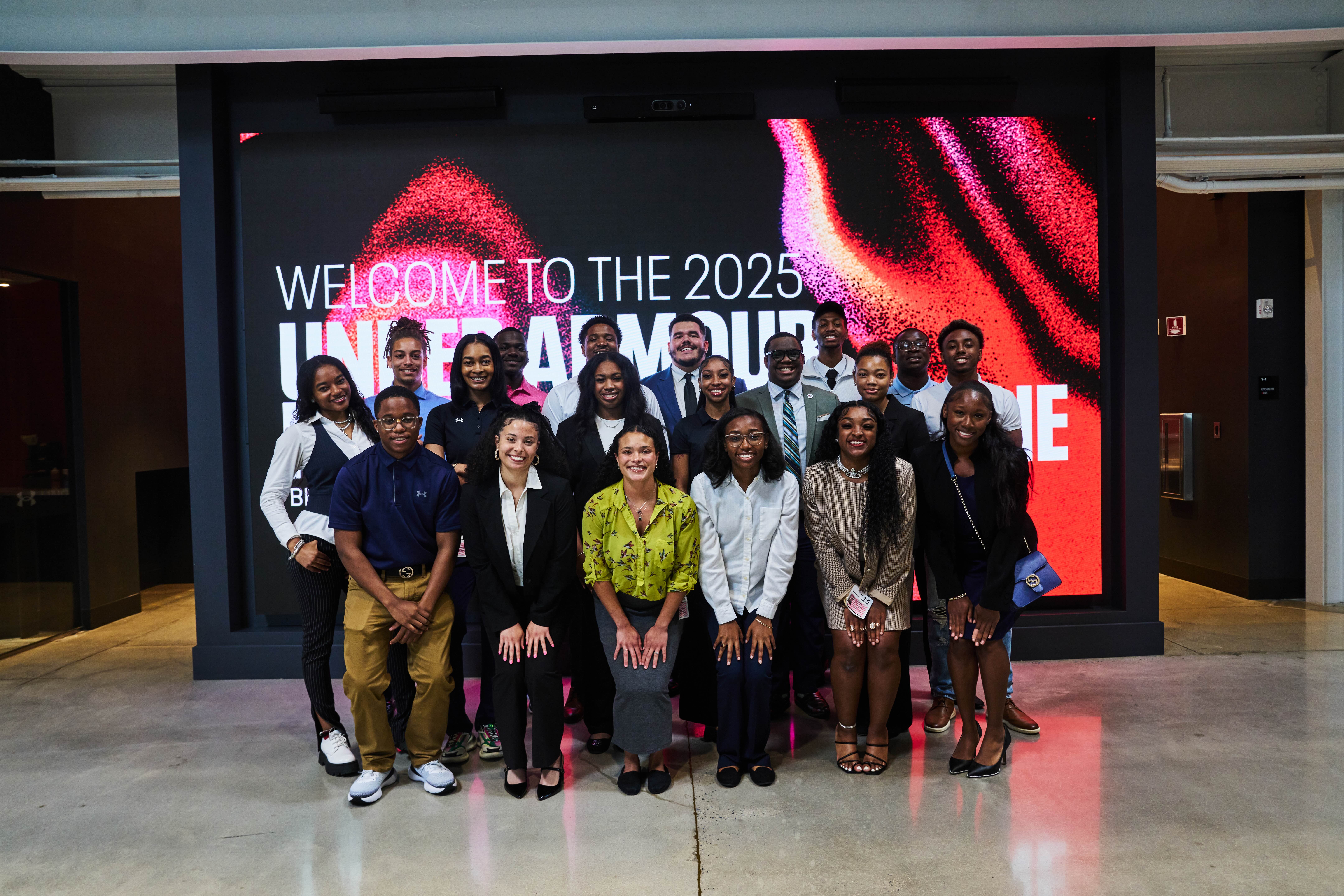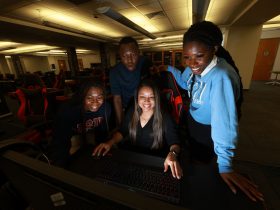First ‘MISTER’ cohort introduced Oct. 8
 (JACKSON, Miss.) – Through a collaboration with Clemson University, Jackson State University has established the nationally recognized Call Me MISTER® program to increase the diversity of teachers, particularly among the lowest performing elementary schools in Mississippi. The collaboration is funded by a $200,000 grant from the W.K. Kellogg Foundation.
(JACKSON, Miss.) – Through a collaboration with Clemson University, Jackson State University has established the nationally recognized Call Me MISTER® program to increase the diversity of teachers, particularly among the lowest performing elementary schools in Mississippi. The collaboration is funded by a $200,000 grant from the W.K. Kellogg Foundation.
To formalize the launch, leaders from Jackson State University and Clemson University gathered Oct. 8 at the JSU Student Center, where they introduced the first Call Me MISTER® cohort.
The cohort includes Jackson natives Alexander Gatewood, Ansel Heidelberg, Cortland Moten and Edward Williams and Atlanta native Malcolm Baldwin. The five freshmen will receive scholarship assistance throughout their studies at JSU.
“This program gives me a chance to work with America’s future,” Baldwin said. “It’s also going to give me the support to help me with my studies.”
Call Me MISTER® is an innovative program that recruits African-American male college students from underserved, socioeconomically disadvantaged and educationally at-risk communities and leads them through a four-year college enrichment experience.
“We are excited about housing the Call Me MISTER® program here at Jackson State University,” said Dr. Daniel Watkins, dean of JSU’s College of Education and Human Development. “This valuable program seeks to increase the pool of black teachers in low performing elementary schools. We are very fortunate to be one of the few states to have this prestigious program.”
Implementing the program will allow JSU to continue to address Mississippi’s most-pressing educational concerns, including closing achievement gaps and the dropout rate. Currently, Mississippi graduates only 46 percent of its black male students from high school, and black males make up only 5 percent of the state’s teacher work force.
“When the students leave this program, they’re going to have not just theory and practice, but they’re going to be leaders,” said Dr. Nikisha Ware, who is executive director of the Mississippi Learning Institute at JSU and will coordinate the university’s Call Me MISTER® program. “That’s extremely key for young black men to have in their formative years.”
MISTER stands for Mentors Instructing Students Toward Effective Role Models. After a decade in South Carolina, 145 MISTERs are enrolled in the program; 80 have graduated from college and been placed in the classroom, resulting in a 40 percent increase in the number of African-American male teachers in South Carolina public elementary schools.
“Think of all the lives that these students will impact and change,” said JSU President Carolyn W. Meyers. “This is proof positive that we are doing all we can do for our community, which is ensuring our future.”
For more information about the Call Me MISTER® program at Jackson State University, contact Dr. Nikisha Ware at 601-979-0208 or nikisha.g.ware@jsums.edu.
Watch Fox40 coverage here.








Hi Anonymous,
I have read both your posts and Dr. Washington’s response. I am alarmed that you could write such a lengthy reply and not respond to his invitation. I will remain optimistic that you do intend to or will respond to his invitation to become involved in the process. As my passion lies in education as well, with a somewhat alternative approach, I would caution you against assuming that the issues in education related to the learning going beyond the simple “transfer of knowledge” is an HBCU issue. This flaw exists in the education system as a whole and all education is biased towards this “transfer of knowledge” approach, i.e. students are graded on how well they regurgitate information on tests, teachers are evaluated by how well they lecture, students are expected to read the book to extend their understanding. With the information highways ever flowing with information, we have reached a critical juncture where students have to be taught how to obtain, dissect, and process this information. It is no longer a given that “students” or “scholars” be walking encyclopedias. The point I make is that the education system is generally biased towards the flaws that you mention. This is not an HBCU issue but one that poses challenges to the entire US education system and requires many “scholars” time and thought. One of your key points, the professor who is the subject matter expert on all things pertaining to his/her discipline is also one of the flaws I speak of. Professors who engage in active learning styles for their students do not present themselves as a know it all. This approach inherently sets the learning paradigm up as a giver/receiver relationship because the professor has all the knowledge the student seeks. To break those barriers, it is necessary for the most effective teachers to present themselves as collaborators in the classroom. They should be there to assist the students with their goals of learning by acting as facilitators of learning. Therefore, it is not alarming that the best professors at any institution be willing to collaborate. Also you ignore the resources that are available to these larger institutions to expand their areas of research. Anonymous, I empathize with your thoughts as I once shared your perspective but I would invite you to join me in a healthy discussion on the issues of education, disparities in the African American community, and HBCU’s.
Thoughtfully,
Ivan Walker (iwalker@gatech.edu)
JSU Alum, Class ’08/’10
B.S./M.S. in Computer Engineering
Doctoral Student
Georgia Institute of Technology
The invitation stands…best to you.
Thank you kindly for your response and invitation. I appreciate your taking the time to address my comments. While I agree that the issues faced by the African American community will take a wholistic approach, I don’t want you to misunderstand the point of my comments, which is not targeted at the College of Education and Human Development at JSU or any one department at JSU or any other HBCU. It’s directed at ALL HBCUs and ALL disciplines. That is to say that with their enrollments being overwhelmingly African Americans, they have first-hand engagement with that demographic and with parents, alumni, neighboring communities, and other constituencies who are African American. As such, EVERY opportunity should be taken to identify critical issues, research the issues, offer recommendations or solutions, implement the recommendations, assess the outcomes and make adjustments based upon the results. This could be done across all disciplines with said HBCU becoming known as the subject-matter expert for ALL things pertaining to African Americans in said discipline. Anytime CNN needed to seek expert opinion on the matter, it should be without question that they need to call said HBCU. Similarly, I would love to see students not just taught theory, but who are encouraged to apply it—in business classes, have them start their own businesses, or invest in the stock market. In computer science, have them to create the “next” FaceBook or IPhone or IPhone Apps. In Mass Communication, have them to launch the next BET or MTV network. Mathematics students could help with the statistical data needed for the studies. They could even work together across disciplines to help each other. Again, my point, and yes, my vision is an educational system that fosters creative and intellectual excellence that goes from merely regurgitating theory to application and which goes from training one to work for someone else to teaching one to create his/her own business. Until we do that—until we stop “miseducating” our students, we will forever be dependent upon others for job creation, for funding, and for leadership. I am not against collaborations, Partnerships and collaborations are welcomed and encouraged, but by the same token, we should be strong partners, nationally recognized for the expertise we bring to the table on all things African American.. Yes, I agree that it would require many stakeholders to join forces to implement such a grand undertaking, but, I believe so much in Jackson State and in South Caroline State and in Howard University, etc. that I cannot allow myself to believe that what can be done at Stanford or Harvard or Clemson, cannot be done at their campuses. Naiive? Perhaps. But, I will continue to believe that we can and we should excel with the best. Again, thank you for your kind response. And, please accept my most sincere best wishes for continued success.
Hello Anonymous,
While I appreciate your points and respect your opinion on these issues, this effort will require a collective body to provide solutions beyond simply stating the obvious. The academic community has its place but so do parents, advocates, stakeholders and most all, those who simply care. I would offer that there are many who work in the field everyday making a difference in the lives of youth here at Jackson State University and outside this great institution that may go unrecognized in spite of their work. The College of Education has always been actively engaged in this process of change and I invite you to join us (as it appears that you are well versed in the problems) and assist us in making a difference. I would love to share our goals with you as we move forward as ONE JSU!! My email is rodney.washington@jsums.edu
Respectfully
Rodney Washington, Chair
Elementary and Early Childhood Education
What an awesome endeavor. We welcome these young men to the future challenge.
Dr. K
My son is one of the MISTERs chosen at JSU…i am so proud and excited for him
This is excellent news!! I am so excited!!
To Anonymous:
While I understand what you are saying and partially agree, I have no problem with this partnership. This program has been established in South Carolina thru Clemson in conjunction with the others schools for quite a while. When my son was considering elementary education as a major, I was tempted to encourage him to go to South Carolina State because of this program. So now when he finishes his U.S. Army enlistment (he chose that instead at the time), I can easily suggest this program and he will be able to attend J.S.U. Nothing but a plus for me!
Actually I think more of these types of collaborations are needed…Of course we should be developing our own programs and launching them as well, but I think working together with another school toward a common goal as long as we are advancing is just fine.
Excellent program!!!
Sounds very promising. I’m excited to hear about this new program. My only hope is that it extends its curriculum to include the Early Childhood arena. Birth to three is a critical “window” that greatly impacts the lives of our youngest citizens. We need intentional caregivers and teachers with a diversified approach to reaching, teaching, nurturing and enhancing infants, toddlers, and preschool aged children, including those with significant disabilities. Great job JSU. Keep up the good work and keep the “smallest” citizens in mind.
Excellent program! While I am extremely pleased that the university is launching a program to address a very critical program facing African American males, I must express my disappointment that it appears that it had to take a collaboration to make it happen. For fear of sounding racist, my point is simply this: with ALL of the PhDs at JSU (and other HBCUs), in ALL of the disciplines, there should NOT be any subject matter/area of crisis facing African Americans that HBCUs are not reserching/addressing. Whatever issues that are being faced by the African American communities, there are ample “scholars” at the univeristy who should be experts on the subject and offering solutions to address them and should be teaching their students to that end. In my opinion, what we have, instead, is a “Miseducation of the Nego” syndrom with little or no true solutions-based learning that is geared towards addressing real-life problems such as health disparities, teen pregnacies, high black on black crime,disproporationate voter participation, disappointing levels of support for African American businesses, the sexed up/dumbed down/profaned out music played on radio stations tarketing African Americans, etc.Likewise, there is little or no fostering of an enterprenurial spirit where students are taught to create their own wealth by owning their own businesses or developing/building new technologies (e.g. Facebook). Is it because the curriculums are not geared towards fostering critical thinking and analytical reasoning? Or that the universities are unable to attract high-quality professors who espouse such pedagogy? Whatever the reason for past under-achievements, I hope that this latest accomplishment is the first of many to come where the university is addressing real-life issues overwhelmingly plagued by the communities and constitutents it serves.
Excellent Program!!! This is just what we need to help stop the classroom to prison pipeline.
Judge T. Green
Jackson MS
ACKNOWLEDGED Date: Thu, 4 Oct 2012 17:27:59 +0000 To: wileywhite@msn.com